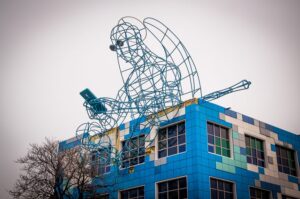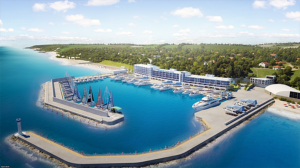
Shareholders of PJSC “Production Association ”Stalkanat” (Odessa) intend to summarize the results of work in 2025 and allocate UAH 89,724,447 thousand for the payment of dividends at the rate of UAH 0.43 per share from the share of profit for the past year.
According to the company’s report in the NSSMC’s information disclosure system, the annual shareholders’ meeting is scheduled for March 12 of this year.
There are nine items on the agenda, including, in particular, consideration of the company’s CEO’s report on financial and economic activities for 2025, determination of the main areas of activity in 2026, consideration of the supervisory board’s report for the past year, review of the auditor’s conclusions, approval of the results of financial and economic activities for 2025, and a decision on the distribution of the company’s profits. A decision on the payment of dividends and a decision on the preliminary approval of significant transactions are planned.
According to the draft decisions reviewed by Interfax-Ukraine, it is planned to approve the results of the company’s financial and economic activities for 2025 and approve the procedure for distributing profits: UAH 89,724,447.58 to be used to pay dividends at a rate of UAH 0.43 per share by direct payment to shareholders; the dividend payment date is September 12, 2026.
The remaining profit will be left as undistributed profit, with the amount of profit for 2025 not specified.
In addition, shareholders plan to pre-approve the company’s significant transactions with Raiffeisen Bank JSC. The maximum total value of pre-approved transactions may not exceed the equivalent of UAH 1.2 billion, and the term of such obligations may not exceed May 1, 2031.
It is planned to approve significant transactions, namely to agree to increase the amount of contracts for the purchase of metal products from UAH 1 billion to UAH 1.5 billion. At the same time, the conclusion of relevant contracts and additional agreements will be confirmed.
As reported, Stalkanat increased its net profit by 4.5 times in the first nine months of 2025 compared to the same period in 2024, from UAH 113.016 million to UAH 504.626 million. During this period, the company increased its net income by 26.5% to UAH 4 billion 33.007 million. Retained earnings at the end of September 2025 amounted to UAH 791.920 million.
In 2024, the company reduced its net profit by 34% compared to the previous year, from UAH 280.060 million to UAH 184.808 million. At the same time, it increased its net income by 33.3%, to UAH 4 billion 436.786 million.
The average number of employees in 2024 was 1,056 thousand people, and the average income per employee was UAH 34,632 thousand.
In 2023, Stalkanat reduced its net profit by 13.8% compared to 2022, from UAH 325.073 million to UAH 280.060 million, but increased its net income by 3.1% to UAH 3 billion 328.170 million.
Stalkanat is one of the largest manufacturers of steel ropes and reinforcement strands in Eastern Europe and a leader in the production of metal products in Ukraine.
According to the NDU for the fourth quarter of 2025, David Nemirovsky owns 50% of the shares, while Anton Mikhalenko (non-resident) and Maria Kondratyuk each own 24.9%.
The authorized capital of PJSC Stalkanat is UAH 17.736 million, with a share par value of UAH 0.17.

The difficult situation in the ports of Odessa and logistics problems are limiting activity in the oilseed sector in Ukraine, according to the information and analytical agency APK-Inform.
“Russian army missile attacks on Ukrainian ports, damage to terminals, warehouses, and other infrastructure will cause a reduction in shipments in the coming months and may destabilize the situation on the global agricultural market,” analysts explained.
They noted that last week, price growth on the Ukrainian soybean export market stalled, which was due to both missile attacks on ports and pressure from the global market, despite the fact that demand for Ukrainian soybeans remained quite high and export rates grew in the first half of December.
Experts added that demand prices for GM soybeans in Ukrainian ports remained at their highest levels since August 2024 – $420-425 per ton (CPT port).
“The European Union has finally postponed the implementation of the EUDR regulation for another year, which will allow companies to increase supplies of soybeans and soybean meal in this direction,” APK-Inform predicts.

The Enforcement Division of the State Enforcement Service has once again listed the Lustdorf sports and recreation complex (Odessa) on the OpenMarket electronic platform (SE “SETAM” of the Ministry of Justice) at a starting price of UAH 191.9 million.
According to the SETAM press service, the total area of the complex is 7,700 square meters. The lot includes an administrative building, a hotel, a sports and recreation complex, a football field, stands, boiler rooms, etc. The land plot is not included in the lot.
The auction is scheduled for January 1, 2026. The guarantee deposit is UAH 9.5 million.
As reported, in 2021, the Kyiv District Court of Odesa upheld the claim of the National Bank of Ukraine against the former owner of Imexbank, Leonid Klimov, and ruled to sell the Lyustdorf sports and recreation complex in Odesa at an open auction to repay UAH 309 million of the bank’s debt on the stabilization loan provided to it.
As the owner of Imexbank, Klimov entered into surety and mortgage agreements with the National Bank in 2014, assuming personal obligations to repay the regulator’s debt on the bank’s stabilization loans.
In January 2016, the National Bank went to court to collect the debt through legal proceedings, as Klimov had failed to fulfill his obligations under the guarantee agreement.
On January 26, 2015, the NBU decided to classify Imexbank as insolvent, and on May 21, 2015, it revoked the bank’s license and liquidated the financial institution.

Search work in Odessa is completed, on more than 60 objects water pumped out, on about 30 more work continues, the victims of the disaster – 10, more than 380 people rescued, said the Minister of internal Affairs of Ukraine Igor Klymenko.
“In Odessa rescuers have completed search operations. Emergency recovery activities continue,” – wrote the Minister in the Telegram channel on Thursday.
He noted that the head of the state emergency service Andrey Danik is working on the site of liquidation of the consequences of the disaster.
“On more than 60 objects in the city specialists of the state emergency service have already fully pumped out water and prepared the infrastructure for further restoration. On about 30 – continue to work. The main thing that made sure: there are no more victims of the elements. There are 10 dead. More than 380 people have been rescued,” informed the head of the Interior Ministry.
According to him, all requests from the population have been processed.
Klimenko noted that the largest masses of water gathered in underground parking lots. “The elimination of waterlogging in these premises is the most difficult. Almost 130 motor pumps are at work, and also attracted attached forces from other regions. Only from the parking lots have already pumped out more than 15 thousand cubic meters of water,” – said the Minister.
As for shelters, according to Klimenko, out of 42 flooded in 40 have already pumped out water and prepared them for use. At 2 civil defense facilities, work is still ongoing.
“Professional training, availability of necessary equipment and experienced personnel were the key to such an effective result. Large areas of restoration work cleaned in such a short period of time – this is an eloquent indicator of the work of the State Emergency Service”, – summarized the head of the Ministry of Internal Affairs.
In addition, he said that throughout the night more than 50 rescuers worked in Slavutych, Kyiv region.
“Deployed 5 mobile points of indestructibility of the State emergency service, equipped with uninterrupted communication systems and devices for recharging gadgets. Prepared generators to support the work of the hospital and other social institutions”, – said the Minister.

Greek Prime Minister Kyriakos Mitsotakis has proposed creating a transport corridor linking the Greek port of Alexandroupolis with Odessa in Ukraine via Varna in Bulgaria and Constanta in Romania.
“I would like Odessa to be at one end of an ambitious, comprehensive project to develop connections that would start in the port of Alexandroupolis, pass through Varna, Constanta, and finally reach Odessa. This is a project that could be proposed for EU funding,” he said at the 4th Ukraine-South-East Europe Summit in Odessa on Wednesday.
According to the prime minister, the corridor would include transport railways, power lines, and gas pipelines, and it would be a project that “would provide an additional transport corridor for Ukraine, much faster than transporting goods by sea.” He also said that the project would provide “a clear and tangible vision of how Ukraine’s integration into the EU can really change the lives of Ukrainians.”
Mitsotakis also assured that Greece would always be ready to contribute any expert or technical support to bring EU candidates closer to accession.